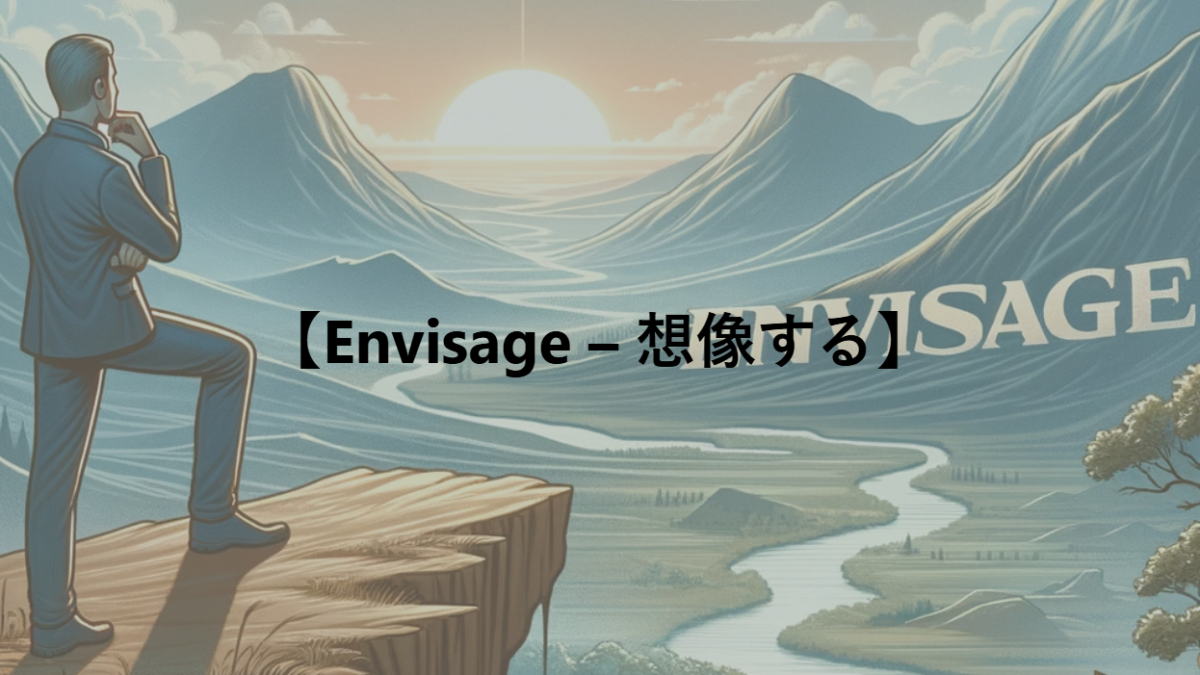語源・類義語・反対語・例文
【Envisage – 想像する】という単語の語源とか由来を知っていますか?
「Envisage」は、「想像する」や「心に描く」という意味を持つ英語の動詞です。この単語はフランス語の「envisager」から英語に取り入れられました。「Envisager」自体は、「visage」(顔)という単語から派生しており、「en-」(~の中に)と組み合わさって「顔を向ける」または「心に描く」という意味になります。ラテン語の「visus」(見ること)がさらにその起源で、「visage」は「見ることができるもの」すなわち「顔」という意味になります。したがって、「envisage」の語源は、文字通りには「顔を向ける」や「視線を向ける」ことから、「心に描く」や「想像する」という抽象的な意味に進化しました。この単語は、将来の出来事や可能性を心に思い描く際に使用されます。
“Envisage” is an English verb meaning “to imagine” or “to picture in the mind.” This word was adopted into English from the French “envisager.” “Envisager” itself derives from the word “visage” (face), combining “en-” (into) to mean “to face” or “to picture.” The Latin “visus” (seeing), further traces its origin, where “visage” means “something that can be seen,” namely “a face.” Therefore, the etymology of “envisage” literally evolves from “to face” or “to direct one’s gaze” to the more abstract meanings of “to picture in the mind” or “to imagine.” This word is used when picturing future events or possibilities in the mind.
この単語の類義語・反対語を教えてください。
類義語
- Imagine: 想像する。心の中でイメージや概念を作り出す行為。
- Visualize: 視覚化する。心の中で具体的なビジュアルイメージを作り出すこと。
- Conceive: 構想する。アイデアや計画を心の中で形成すること。
- Foresee: 予見する。将来起こりうることを心の中で見ること。
- Anticipate: 予期する。将来起こることをあらかじめ考えること。
反対語
- Overlook: 見落とす。重要なことを見逃すまたは無視すること。
- Disregard: 無視する。意図的に注意を払わないこと。
- Ignore: 無視する。意識的に認識しないこと。
- Miss: 逃す。気付かないか、理解できない状態。
似た単語で間違いやすい単語はありますか?
- Envision: 「Envision」と「Envisage」はしばしば同義語として使用されますが、「envision」は通常、未来に対するより具体的かつ楽観的なビジョンを思い描く際に使われることが多いです。一方、「envisage」は将来の可能性を広く想像することを含み、必ずしも楽観的である必要はありません。
- Imagine: 「Imagine」は「想像する」という意味で、「envisage」と非常に似ていますが、「imagine」は現実の制約にとらわれず、より自由な想像を行う際に用いられることがあります。一方、「envisage」は将来の具体的なシナリオや計画を思い描く際に使われることが多いです。
- Visualize: 「Visualize」は、心の中で具体的なビジュアルイメージを作り出すことを指し、しばしば瞑想やパフォーマンスの向上の文脈で使用されます。「Envisage」が将来の出来事を心に描くことを意味するのに対し、「visualize」は特定の画像やシーンを詳細に想像することに重点を置いています。
- Predict: 「Predict」は将来の出来事についての宣言や予測を行うことを意味し、しばしばデータや以前の経験に基づいています。「Envisage」が可能性やシナリオを想像することを意味するのに対し、「predict」はより確定的な未来の出来事についての予言に関連しています。
この単語を使った例文
“I cannot envisage a future without technology.”
私には技術のない未来を想像することができません。
“The architect envisaged a modern building that would stand out in the city skyline.”
建築家は、都市のスカイラインに映えるモダンな建物を想像しました。
“She envisaged a new approach to solve the persistent problem.”
彼女は根強い問題を解決するための新しいアプローチを想像しました。
“We need to envisage all possible outcomes before making a decision.”
決定を下す前に、可能な全ての結果を想像する必要があります。
“The novel allows readers to envisage a world vastly different from our own.”
その小説は読者に、私たちの世界とは大きく異なる世界を想像させます。
【Envisage – 想像する】のコロケーション
- Envisage the future: 未来を想像する。このフレーズは、将来に起こり得る事象や状況を心に思い描くことを意味します。計画や予測を立てる際によく使用されます。
- Envisage a scenario: シナリオを想像する。特定の状況や出来事の連続を心に思い描くことを指します。ビジネスや学術的な文脈で、将来の展開や可能性を考える際に使われます。
- Envisage a solution: 解決策を想像する。問題や挑戦に対する潜在的な解決策を心に思い描くことを指します。問題解決のプロセスにおいて重要なステップです。
- Envisage the consequences: 結果を想像する。特定の行動や決定の後に生じる可能性のある結果を心に思い描くことを意味します。リスク管理や意思決定の文脈で使用されます。
- Envisage a possibility: 可能性を想像する。何かが起こる可能性を心に思い描くことを指します。希望や不安、計画の文脈で使われることがあります。
「Envisage – 想像する」という言葉は、様々なシナリオ、結果、または可能性を想像または心に描く行為を反映したいくつかのコロケーションと関連しています。これらの一般的なコロケーションを理解することで、「envisage」が異なる文脈でどのように使用されるかの理解が深まり、将来を見据えた想像の性質が強調されます。
「Envisage the future」は、今後の日々、月、年に何が起こるかを想像することを意味します。このフレーズは、計画や予測を立てる際に頻繁に使用され、個人が今後に備えるための心の準備をするのに役立ちます。
「Envisage a scenario」は、特定の出来事や状況の連続を心に描くことを指します。これは、特にビジネスや学術の文脈で関連性があり、戦略の策定や研究のために未来の発展や可能性を考えることが重要です。
「Envisage a solution」は、問題や挑戦に対する潜在的な答えやアプローチを視覚化する行為を表します。問題解決プロセスにおいて不可欠なステップであり、障害を克服する可能性のある方法を特定するのに役立ちます。
「Envisage the consequences」は、特定の行動や決定から生じる可能性のある結果を心に描くことを意味します。これはリスク管理や意思決定において使用され、個人が進む前に自分の選択の結果を考慮するのを助けます。
「Envisage a possibility」は、何かが起こる可能性を想像することに関しています。これは、将来のイベントについて考える際の推測の側面を強調し、希望、恐怖、計画の文脈で使用されることがあります。
これらのコロケーションは、「envisage」が未来の出来事、解決策、シナリオ、結果、または可能性について考える際にどのように利用されるかを示しています。各表現は、想像のプロセスとその応用の具体的な例を提供し、「envisage」が様々な条件の下で何が起こるか、何をすべきか、または何が起こり得るかについて考える際の有用性を示しています。
The term “Envisage – 想像する” is associated with various collocations that reflect the act of picturing or imagining different scenarios, outcomes, or possibilities. Understanding these common collocations enriches our comprehension of how “envisage” is used in different contexts, emphasizing the forward-looking nature of envisioning.
“Envisage the future” involves imagining what might happen in the coming days, months, or years. This phrase is frequently used when making plans or forecasts, allowing individuals to prepare mentally for what lies ahead.
“Envisage a scenario” refers to picturing a specific sequence of events or situations. This is particularly relevant in business or academic contexts, where contemplating future developments or possibilities is crucial for strategy formulation or research.
“Envisage a solution” denotes the act of visualizing a potential answer or approach to a problem or challenge. It’s an essential step in the problem-solving process, helping to identify possible ways to overcome obstacles.
“Envisage the consequences” means to mentally picture what might result from certain actions or decisions. This is used in risk management and decision-making, enabling individuals to consider the outcomes of their choices before proceeding.
“Envisage a possibility” is about imagining that something could happen, highlighting the speculative aspect of thinking about future events. It can be used in contexts of hope, fear, or planning, reflecting on what might occur under different circumstances.
These collocations demonstrate how “envisage” is employed to think about future events, solutions, scenarios, consequences, or possibilities. Each expression provides a concrete example of the imaginative process and its applications, showcasing the utility of “envisage” in contemplating what lies ahead, what could be done, or what might happen under various conditions.
文法問題: Envisage (想像する)
- The city planners _ a future where all transportation is electric and self-driving.
- (A) envision
- (B) envisage
- (C) envisioning
- (D) envisaged
解答と解説: (B) envisage
envisage は「心に描く、想像する」という意味の動詞です。文脈から、都市計画者が未来の交通システムを想像していることがわかります。envision も同じ意味を持ちますが、イギリス英語では envisage がより一般的です。envisioning は動名詞、envisaged は過去形・過去分詞形で、文脈に合いません。
- It is difficult to _ a world without the internet, given how integrated it has become into our daily lives.
- (A) envision
- (B) envisage
- (C) envisioning
- (D) envisaged
解答と解説: (B) envisage
この文脈では、インターネットのない世界を想像することが難しいという内容なので、”envisage” が適切です。
- The entrepreneur _ a company that would revolutionize the way people communicate.
- (A) envision
- (B) envisage
- (C) envisioning
- (D) envisaged
解答と解説: (D) envisaged
この文脈では、起業家が会社を想像したという過去の出来事を表しているので、過去形の “envisaged” が適切です。
- The architect’s drawings _ a stunning modern building with floor-to-ceiling windows and a rooftop garden.
- (A) envision
- (B) envisage
- (C) envisioning
- (D) envisaged
解答と解説: (D) envisaged
この文脈では、建築家の図面が建物を想像したもの、つまり過去の行為の結果を表しているので、過去分詞の “envisaged” が適切です。
- The author’s latest novel _ a dystopian future where society is controlled by artificial intelligence.
- (A) envisions
- (B) envisages
- (C) envisioning
- (D) envisaged
解答と解説: (A) envisions または (B) envisages
この文脈では、小説が未来を想像しているという内容なので、”envisions” または “envisages” が適切です。どちらの単語も「心に描く、想像する」という意味を持ちますが、イギリス英語では envisages がより一般的です。

